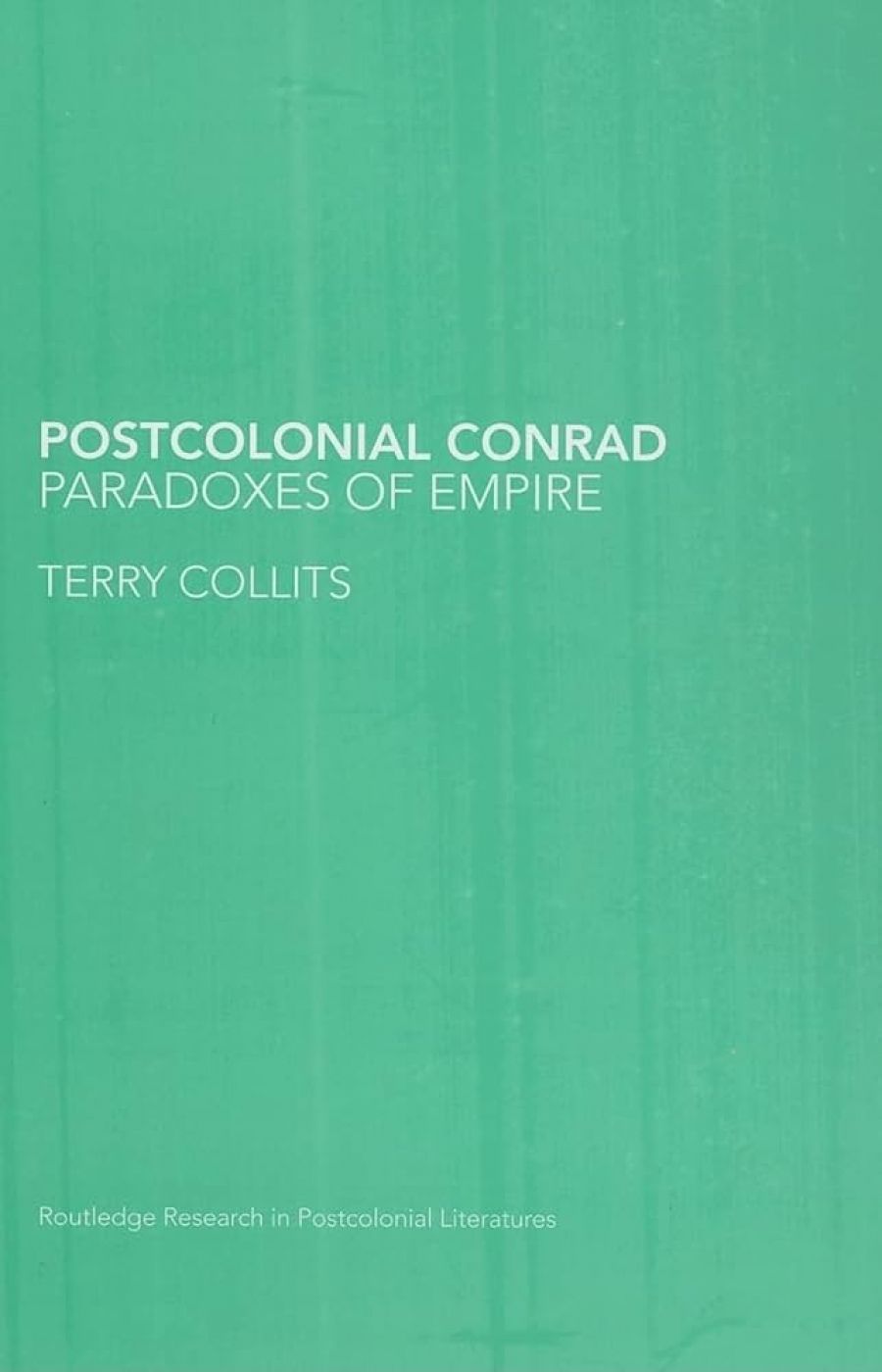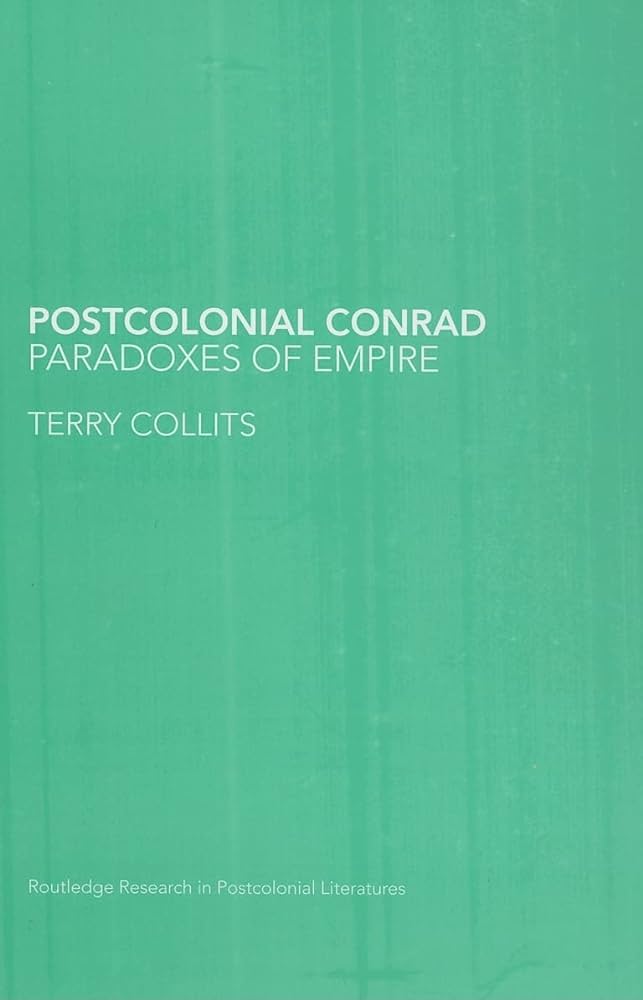
- Free Article: No
- Contents Category: Literary Studies
- Review Article: Yes
- Article Title: Closure and Conrad
- Online Only: No
- Custom Highlight Text:
Through the significant cultural presence of Heart of Darkness, I am regularly confronted with the work of Joseph Conrad in my everyday life: an elephant in Disney’s Tarzan exclaims ‘the horror’ at the sight of a human camp; a young man reads the novella on a ship bound for Skull Island in the latest King Kong; and, during the fortnight while I am writing this review, Radio National is broadcasting a serialised reading of the novella each afternoon. In Postcolonial Conrad: Paradoxes of Empire, Terry Collits wonders ‘how … we may read and understand Conrad nowadays’. With so many cultural claims to just one Conradian text, such a question is timely.
- Book 1 Title: Postcolonial Conrad
- Book 1 Subtitle: Paradoxes of empire
- Book 1 Biblio: Routledge, $176 pb, 226pp
- Book 1 Cover Small (400 x 600):

- Book 1 Cover (800 x 1200):

Collits’s book is the twelfth publication in the Routledge Research in Postcolonial Literatures series. Begun in 1998 with the publication of Brenda Cooper’s Magical Realism in West African Fiction: Seeing with a Third Eye, this series has included studies on literature from Africa, the Caribbean, India and the Pacific region, as well as a post-colonial analysis of Jane Austen. The range of material collected by Routledge in these and forthcoming volumes exhibits this publisher’s confidence in the contribution that post-colonial critique can make to conversations about knowledge and ideas. Furthermore, a sticker declaring it the winner of the New South Wales Premier’s Award for literary scholarship demonstrates the value placed on the book by at least a few astute readers. But the price is prohibitive, and many readers will have to wait until their libraries make the purchase for them.
Collits’s book begins by locating Conrad’s fiction in the shifting intellectual field and tracing its significance at particular ‘moments’ throughout the twentieth century. The ‘epistemological crisis around 1900’ in which conventional knowledge and ideas were being challenged by the disintegration of empire provides the context in which much of Conrad’s early work was written, especially the well-known texts Heart of Darkness (1899) and Lord Jim (1900). Collits employs the work of Edward Said, among others, to show how Conrad was able to negotiate ‘the nexus between knowledge and ideas on the one hand and politics and power on the other’, subsequently ensuring his relevance to many twentieth-century commentators. Collits argues that the tragic nature of Conrad’s novels plays out the ‘discursive crisis’ in which they were circulating, leaving significant traces of the history of knowledge and politics in their texts. Such extra-textual material was lost, however, following Conrad’s inclusion in F.R. Leavis’s Great Tradition (1948), a Conradian moment that helped to canonise some of his work while impeding analyses of others. Following this period, discussion of Conrad’s politics was invigorated by Marxist critics such as Raymond Williams, Fredric Jameson and Terry Eagleton despite ongoing and unresolvable differences of opinion. Collits demonstrates how their readings of Conrad’s novels became an important part of his reception in the twentieth century. But Conrad’s continued presence in the academy was both challenged and consolidated by Chinua Achebe’s proclamation that Conrad was a racist because of his representation of Africans in Heart of Darkness, heralding the post-colonial moment that we continue to discuss with varying amounts of enthusiasm. Most importantly for Collits, Conrad’s fiction was informed by, and has subsequently informed, an ‘ineluctable desire to know’ an un-knowable world, a position that aligns Conrad, he suggests, most closely with the work of Jacques Lacan.
With such intellectual traditions in mind, Collits offers close readings of several novels in the second part of the book to show more clearly how twentieth-century ideas have circulated around and through Conrad’s fiction. Heart of Darkness is discussed to show how Conrad’s refusal to name the ‘horror’ of Kurtz’s existence is tied to the epistemological crisis of its time, reflecting the human incapacity to know. So, too, Collits demonstrates that the conventional ideas that inform Jim’s actions in Lord Jim have little foundation, and that his ongoing search for meaning can only end in tragedy. Conrad’s challenge to realism is seen most strikingly in the complex narrative structure of Nostromo (1904), a novel, according to Collits, that shows the inability to situate an undifferentiated hero in an imperial situation that aspires to the epic. The book concludes with two chapters on the oft-dismissed late novel Victory (1915), in which Conrad’s use of allegory is seen as an antidote to the impossibility of realism and Wang’s active role in the narrative is suggested as a precursor to later post-colonial writing. Throughout these readings, Collits avoids many post-colonial theorists one might expect in this book, and it is only through Wang that he fully engages with ‘the other’. Nevertheless, his exposition of Conrad’s serious engagement with the fragility of imperial enterprises remains admirable.
This book offers more than enough for the reader of Conrad’s fiction to deserve serious attention. Its review of the intellectual traditions into which Conrad’s novels can be situated, and of the history of Conrad’s reception by esteemed readers, is extremely valuable. Collits helps to situate early twenty-first century readers in relation to these books with a solid grounding in the chain of events that inform current attitudes to knowledge and ideas. But if he provides no better advice, it is that in studies like his one will always find a ‘ humbling reminder that the interpretative process knows no closure’. Perhaps it is time to take another look at these books that have maintained such an important position in our ongoing conversation about ideas and knowledge.


Comments powered by CComment